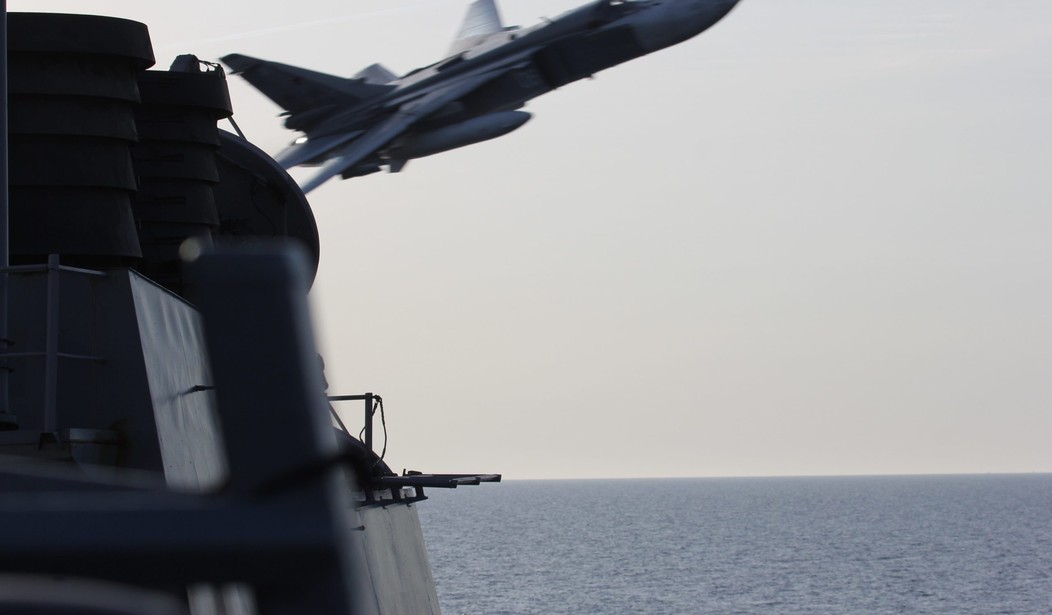Defense Secretary Ashton Carter said Russia’s “unprofessional behavior by its nature creates a dangerous circumstance” with too-close-for-comfort flybys of U.S. ships and aircraft in the Baltic Sea region.
In mid-April, two Russian SU-24 jets made “numerous close-range and low altitude passes” that led the USS Donald Cook to suspend flight operations until the Russian planes were gone. Then, a Russian KA-27 Helix helicopter “conducted circles at low altitude around the ship, seven in total, at approximately 5 p.m. local.” In a later incident, a U.S. Air Force reconnaissance plane over the Baltic Sea was barrel-rolled by a Russian Su-27.
On Friday, Russian Su-27 flew within 25 feet of the fuselage of a U.S. Air Force RC-135 aircraft over the Baltic.
Defense Department spokeswoman Lt. Col Michelle Baldanza said the U.S. aircraft crossed into Russian territory “at no time.”
The Russian plance “performed erratic and aggressive maneuvers”, Baldanza said, and “the SU-27 intercepted the U.S. aircraft flying a routine route at high rate of speed from the side then proceeded to perform an aggressive maneuver that posed a threat to the safety of the U.S. aircrew in the RC-135.”
“This unsafe and unprofessional air intercept has the potential to cause serious harm and injury to all aircrews involved. More importantly, the unsafe and unprofessional actions of a single pilot have the potential to unnecessarily escalate tensions between countries,” she added.
En route to Stuttgart, Germany, on Monday, Carter was asked if this aggression was coming from the Kremlin or “freelance pilots.”
“I can’t answer for the internal dynamics in Russia. It’s unprofessional, and it’s dangerous because our forces and those of all our other partners there have an inherent right to self-defense, so this kind of unprofessional behavior by its nature creates a dangerous circumstance,” Carter replied.
“And without presuming to know how these events occur, I’ll just say that they have seemed in recent times to becoming more frequent, and so it’s one more aspect of Russian conduct in the military sphere, which sets us apart from, first of all, everybody else in Europe, as well as the United States, but also from the path that Russia was on, which was one that I can continue to believe is best for the Russian people in the long run, and that’s one of integration with the rest of the world. That’s how we are prosperous. That’s how we make advances. Setting yourself apart doesn’t do that.”
The Defense secretary added that “obviously that’s not the choice that Russia’s leadership is making at this time.”
“And therefore we have no alternative but to do what we’re doing, which is stand strong, as I’ve said, and balanced,” Carter continued. “That’s the approach that I’ve described as our approach, strong meaning we’re doing all of these things that we’re doing to improve our forces qualitatively, improve them quantitatively in Europe, improve NATO’s capabilities working with others, investing in future capabilities, all the while continuing to hold the door open if Russian behavior should change, but also work with Russia where we can.”
“And it does happen. The Iranian nuclear agreement is an example of that, so that’s just the way one has to realistically deal with Russia today.”
On Friday, the Russian Defense Ministry announced that the Baltic air defense crews won the top prize in a “Keys to the Sky” competition between their Baltic, Pacific and Northern fleets.
“They were the best in detection, locking on, tracking and elimination of simulated enemy aerial means of attack,” the Defense Ministry said.








Join the conversation as a VIP Member